
How To Effectively Use Company Swag In Your Marketing Strategy
Swag can range from branded pens and tote bags to t-shirts and phone cases. They're the little (or not so little) gifts that companies give to their customers, clients, and employees to help spread the word about their brand.
But why is swag such an important tool in a marketer's arsenal?
Well, it's simple. People love free stuff! And when that free stuff is a useful, high-quality item with your company's logo on it, it becomes a walking billboard for your brand.
Swag helps build brand recognition, loyalty, and trust among your target audience. It's also a tangible way to show appreciation to your customers and employees while also driving brand awareness.
But, as with any marketing tactic, there are best practices and tips to ensure that your swag strategy is effective. In this blog post, we'll cover
- The benefits of using swag in a marketing strategy
- Use cases for different types of swag,
- Choosing the right product,
- Best practices for using swag in a marketing strategy, and
- Tips for maximizing the impact of your swag by aligning it to your marketing strategies.
So, sit back, and let’s get into it!
Does company swag work in marketing strategies?
If you're wondering whether or not investing in company swag is a valuable marketing strategy, the answer is a definite yes!
Here's why.
Firstly, the fact that 80% of consumers possess at least one promotional product indicates that swag is an effective way to expose your brand to potential customers. Additionally, 53% of people use a promotional product weekly, which translates to regular exposure for your brand.
Promotional products are kept by 60% of people for up to two years, providing an extended period of brand exposure for a relatively low investment in swag.
From a business perspective, 79% of individuals who see or receive promotional products research the company afterward, highlighting swag as a potent lead generation tool. If your goal is to increase brand awareness, improve customer loyalty, or generate leads, swag can be a valuable asset in achieving those objectives.
Lastly, it's crucial to select the right products that are both unique and useful. An astounding 89% of consumers remember the brand if its promotional products are unique and useful.
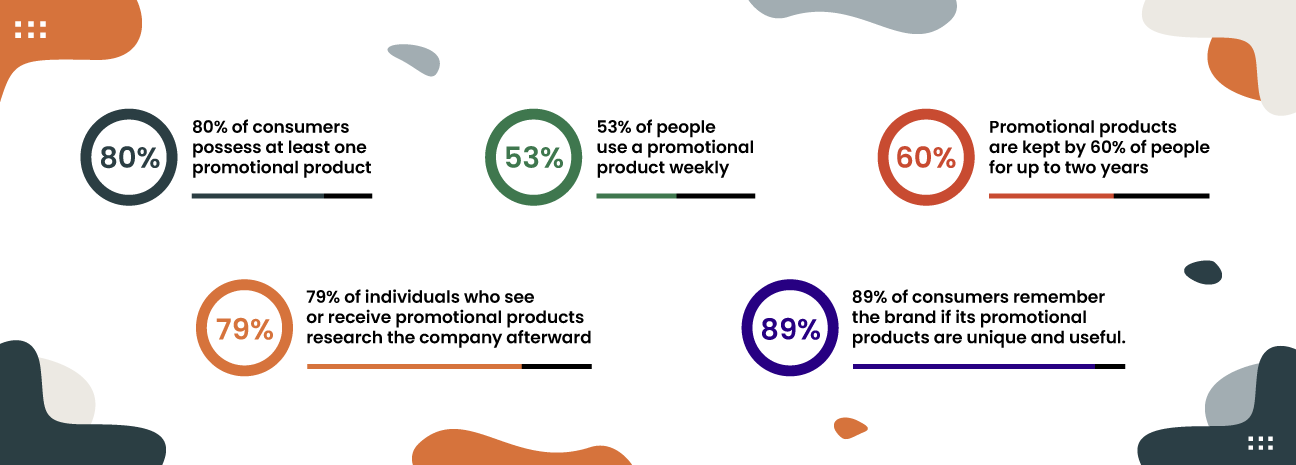
Benefits of using swag in your marketing strategy
Using branded swag in your marketing strategy can bring a ton of benefits to your brand. Not only does it provide a tangible way to show appreciation to your customers and employees, but it also helps build brand recognition, loyalty, and trust among your target audience.
Let's dive into the 8 key benefits of using swag in your marketing strategy.
- Increased brand awareness
- Increased customer loyalty and retention
- Cost-effective marketing
- Differentiation from competitors
- Enhanced employee morale and productivity
- Long-lasting impact on recipients
- Positive association with the brand
- Improved lead generation and customer engagement
Let’s a closer look at each .
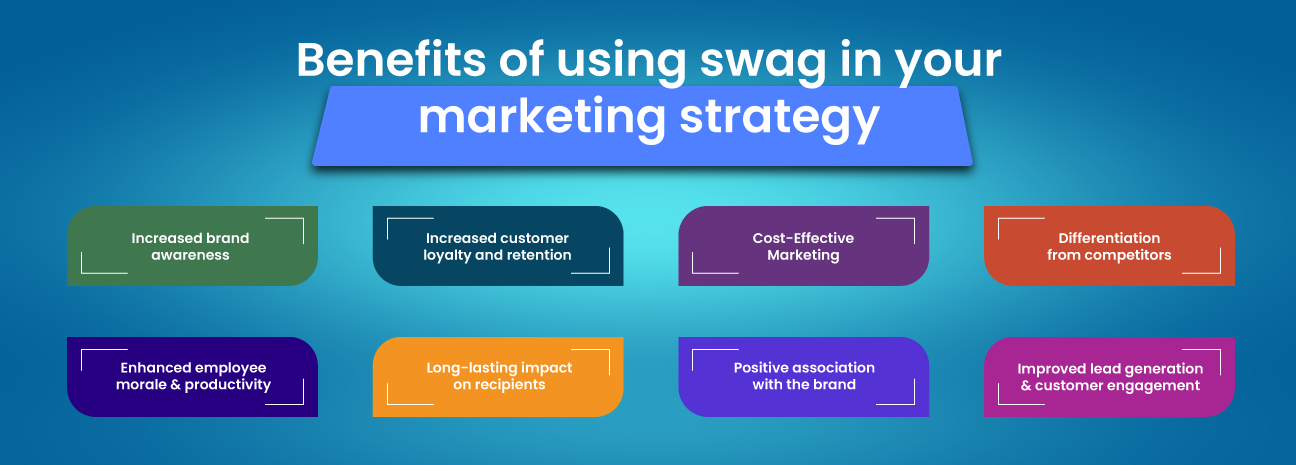
1. Increased brand awareness
Swag can help increase brand awareness by creating a lasting impression on potential customers. When customers wear or use your branded swag items, it provides exposure for your brand beyond traditional marketing methods. And the more people see your brand, the more likely they are to remember it.
2. Increased customer loyalty and retention
Swag can also help build customer loyalty and retention. By showing customers that you appreciate their business with a thoughtful gift, you create a positive association with your brand. This can lead to repeat business and even referrals as customers share their positive experiences with others.
3. Cost-Effective Marketing
Swag is a cost-effective marketing tactic because it can provide continued exposure for your brand for years to come. Unlike traditional advertising, which can be expensive and fleeting, swag items can last a long time, making them a smart investment. Additionally, swag can be used as an incentive for customers to take certain actions, such as making a purchase or referring a friend, making it a versatile marketing tool.
4. Differentiation from competitors
Swag can help differentiate your brand from competitors. By offering unique and high-quality swag items, you can create a memorable and positive impression on potential customers. This can help your brand stand out in a crowded market, making it more likely that people will choose your brand over competitors.
5. Enhanced employee morale and productivity
Swag can also be used to boost employee morale and productivity. When employees receive branded swag items, it makes them feel appreciated and part of the team. This can lead to increased motivation and productivity, which ultimately benefits your brand.
Additionally, branded swag items can create a sense of unity among employees, helping to build a positive company culture.
Also read, 5 Steps To Building A Strong Employee Experience Strategy.
6. Long-lasting impact on recipients
Swag can also have a long-lasting impact on recipients, which can translate into increased loyalty and positive associations with your brand. People tend to hold onto useful items like water bottles or tote bags, which means they'll continue to use and see your logo long after receiving the swag.
This extended exposure can help cement your brand in their minds and create positive associations with your products or services.
7. Positive association with the brand
By giving out swag, you're not just promoting your brand; you're also creating a positive association with it. When someone receives a free item from your company, they're more likely to view your brand in a positive light. This positive association can lead to increased loyalty and repeat business.
Plus, if someone loves your swag, they may be more likely to recommend your brand to others.
8. Improved lead generation and customer engagement
Finally, swag can be an effective tool for lead generation and customer engagement. By giving out swag at events or trade shows, you can start conversations with potential customers and collect their contact information for follow-up.
Additionally, swag can be used as a reward for completing surveys or signing up for a newsletter, which can incentivize people to engage with your brand.
Use cases for swag in marketing strategies
Swag, or promotional merchandise, can be a powerful tool in your marketing strategy. Whether you're looking to generate leads, build brand awareness, or retain customers, swag can help you achieve your goals.
In this section, we'll explore each of these use cases for swag in marketing strategies and provide a few examples for each.
1. Swag for lead generation
Lead generation is an essential part of any marketing strategy. Swag can be a great way to generate leads and collect contact information from potential customers. By offering swag as an incentive for filling out a form or providing their email address, you can encourage people to engage with your brand and move them further down the sales funnel.
Some examples of swag that work well for lead generation include:
- Customized water bottles or travel mugs with your logo,
- Branded phone chargers or USB drives, and
- Personalized notebooks or journals.
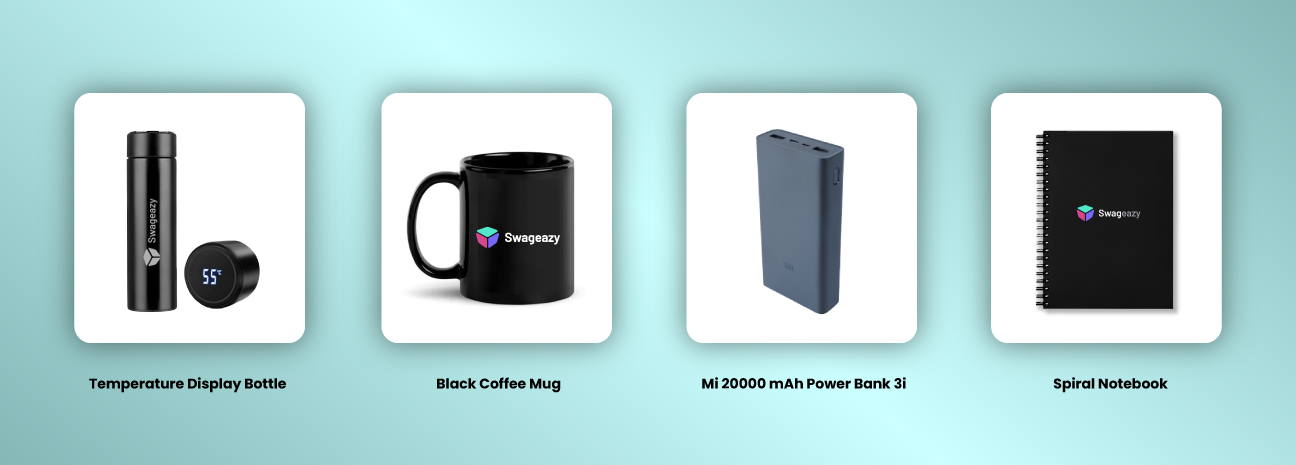
These items are useful and practical, and people are more likely to keep them around, which increases the chances of them seeing your brand and remembering your message.
2. Swag for building brand awareness
Building brand awareness is another crucial part of any marketing strategy. If people don't know about your brand, they can't become customers. Swag can be a great option for building brand awareness because it's a tangible way to showcase your brand to potential customers.
Examples of swag that work well for building brand awareness include
- Customized t-shirts, hats, or jackets,
- Branded tote bags or backpacks, and
- Logo stickers or magnets.
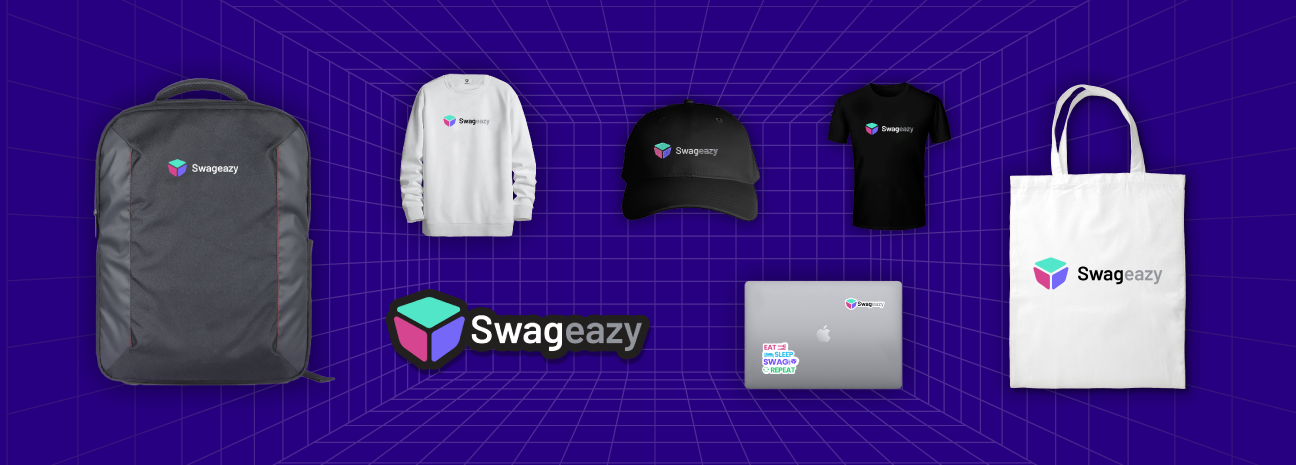
These items not only showcase your brand but also create a sense of community among people who wear or display them. When people see others wearing or using your swag, they're more likely to remember your brand and check it out.
3. Swag for events and conferences
Events and conferences are excellent opportunities to connect with potential customers and generate leads. Swag can help make your booth or table stand out and leave a lasting impression on attendees.
Examples of swag that work well for events and conferences include
- Branded lanyards or badges,
- Customized pens or notepads, and
- Personalized stress balls or fidget spinners.
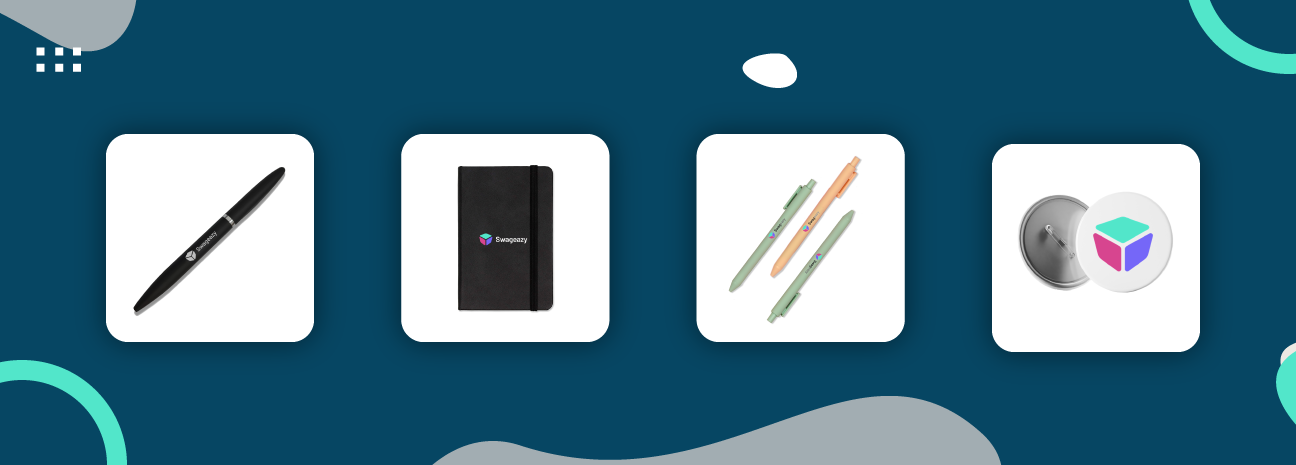
These items are small and easy to carry, making them perfect for events where attendees are already carrying a lot of things. By offering useful and fun swag, you'll make a positive impression on attendees and increase the chances of them becoming customers.
4. Swag for entering a new market
If you're entering a new market or launching a new product, swag can help you make a splash and get noticed. By giving out swag that's specific to the new market or product, you can create excitement and buzz.
Examples of swag that work well for entering a new market include
- Customized hats or t-shirts with the new product name or market location,
- Branded tote bags or water bottles with the new market logo, and
- Personalized stickers or pins with the new market or product design.
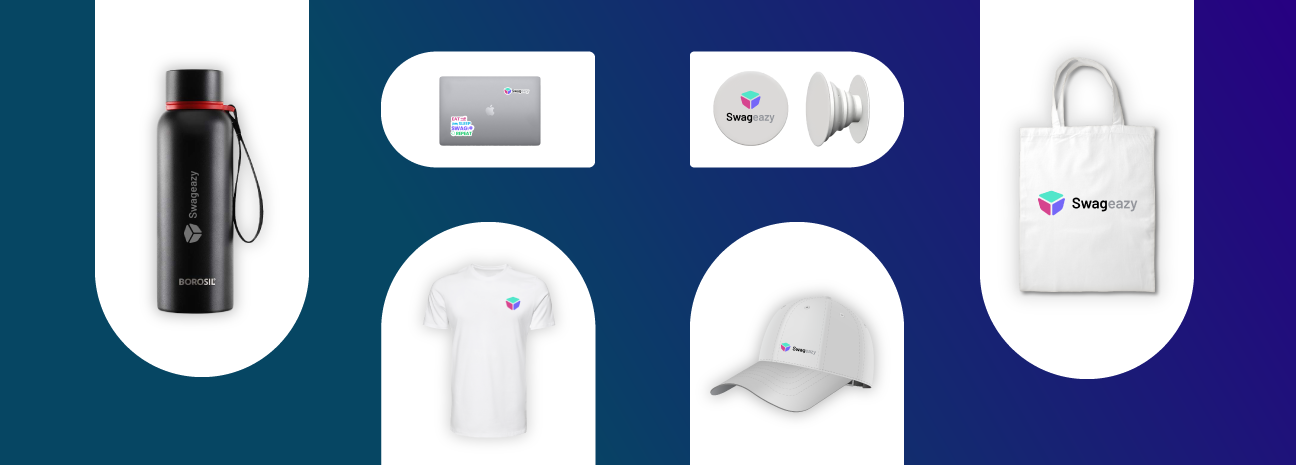
These items can help create a sense of excitement and curiosity around your brand, making it more likely that people will check out your products or services.
5. Swag for retaining customers
Retention is just as important as acquisition when it comes to building a successful business. Swag can be a great way to show your existing customers that you appreciate their business and value their loyalty.
Examples of swag that work well for retaining customers include
- Branded mugs or glasses,
- Customized keychains or phone cases, and
- Personalized thank-you notes or greeting cards
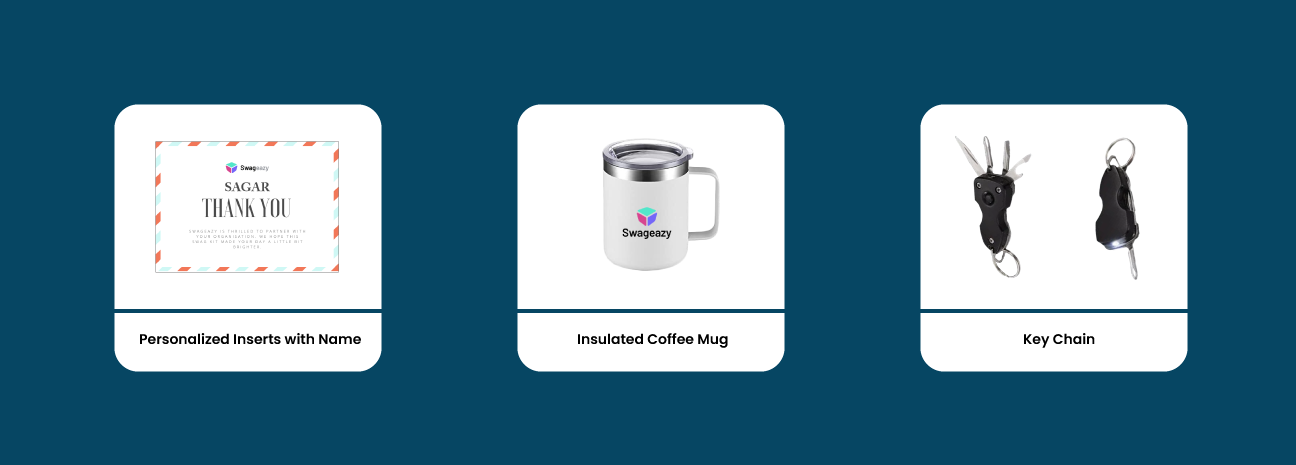
These items show your customers that you care about them and value their business, which can lead to increased loyalty and repeat business.
6. Swag for employee experience
Finally, don't forget about the importance of swag for your employees. Swag can help build company culture and create a sense of belonging among your team members. When employees feel valued and appreciated, they're more likely to be engaged and productive.
Examples of swag that work well for employee experience include
- Customized company t-shirts or hats,
- Branded coffee mugs or water bottles, and
- Personalized notebooks or pens.
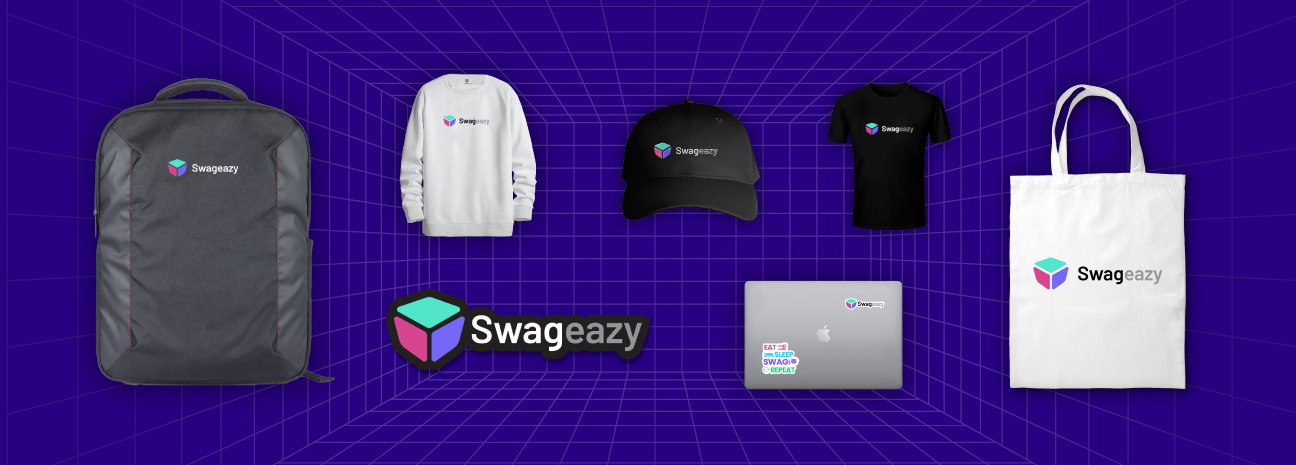
These items not only create a sense of community among your employees but also showcase your brand and create a unified look. By investing in swag for your employees, you're investing in your company culture and ultimately your bottom line.
Also read, 15 Ways Swag Can Be Used For Employee Engagement.
Choosing the right products
Let's talk about three things you need to consider when choosing the right swag products for your marketing strategy.
- Customizable options and personalization
- Target audience and their preferences
- Budget considerations
1. Customizable options and personalization
One of the most important things to consider when choosing swag is customization and personalization. You want your swag to stand out from the crowd and make a lasting impression on your audience. One way to do this is to choose products that can be customized with your brand's colors, logo, or messaging.
Some customizable options for swag include t-shirts, tote bags, hats, water bottles, and keychains. By adding your brand's logo or tagline to these items, you can create a cohesive and memorable look for your swag.
Additionally, consider personalizing your swag with the recipient's name or a personalized message to make it even more special.
With Swageazy, every product and swag pack we offer can be customized entirely to fit your recipient’s needs and preferences, so no matter what you gift them, you can be sure that it’s tailored to their individual preferences.
2. Target audience and their preferences
Another key factor to consider when choosing swag products is your target audience and their preferences. You want to choose swag that is relevant and useful to your target audience, as well as reflective of their interests and lifestyle.
For example, if your target audience is primarily young professionals, consider swag such as phone chargers, Bluetooth speakers, or tech accessories. If your target audience is more health-conscious, choose items such as yoga mats, resistance bands, or water bottles.
By understanding your audience's preferences, you can choose swag items that are not only relevant to them but also increase the likelihood that they will use and appreciate your swag.
3. Budget considerations
Lastly, it's important to consider your budget when choosing swag products. Swag can be a cost-effective marketing strategy, but it's still important to set a budget and choose items that fit within it.
Consider the quantity of swag you need and whether you can get a discount for ordering in bulk. Additionally, consider the cost per item and whether it aligns with the ROI you're hoping to achieve with your marketing strategy.
7 best practices for using swag in your marketing strategy
Here are 7 best practices for using swag in your marketing strategy.
- Set clear goals and objectives
- Research your target audience
- Quality over quantity
- Create a memorable experience
- Ensure time and efficient delivery
- Follow up with recipients and engage them
- Collect feedback
Let’s dive deeper into each of them.
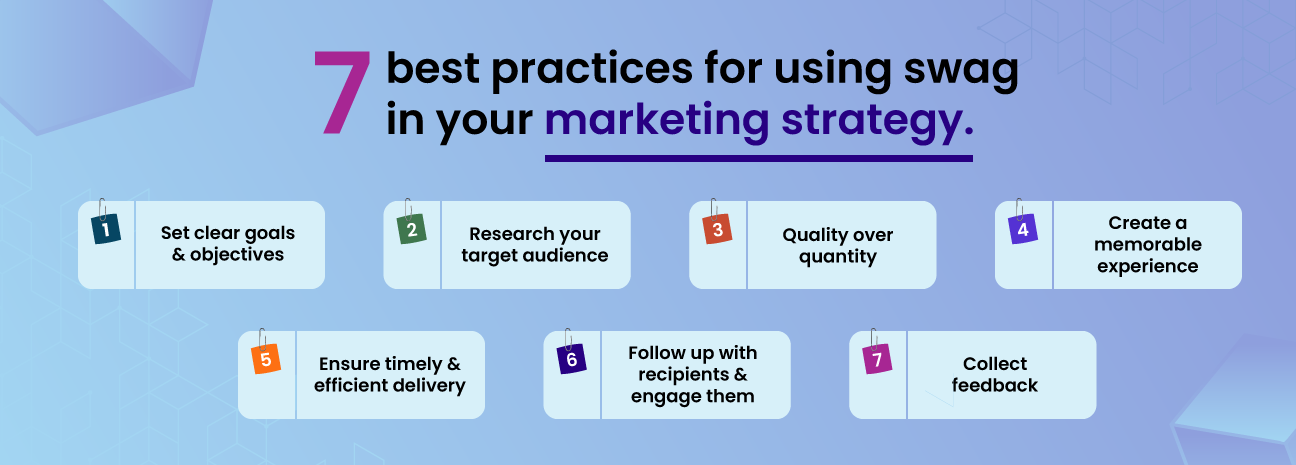
1. Set clear goals and objectives
Setting clear goals and objectives for your marketing strategy is crucial when it comes to swag. Without clear goals, it can be difficult to determine which swag items are most effective and whether your strategy is working as intended.
For example, if your goal is to increase brand awareness, you may want to choose swag items that prominently feature your company logo or brand colors. Alternatively, if your goal is to generate leads, you may want to choose swag items that require recipients to provide their contact information in exchange for the item.
2. Research your target audience
When it comes to swag, it's important to choose items that resonate with your target audience. Researching your target audience can help you determine which types of swag items they're most likely to use and keep.
For example, if your target audience consists of tech-savvy millennials, you may want to consider swag items like smartphone accessories or wearable technology. Alternatively, if your target audience consists of busy professionals, you may want to choose swag items like branded notebooks or pens.
3. Quality over quantity
While it may be tempting to order a large number of inexpensive swag items, prioritizing quality over quantity can lead to a more effective marketing strategy. High-quality swag items are more likely to make a lasting impression on recipients and be used for a longer period of time.
For example, instead of ordering a large quantity of cheap plastic water bottles, consider investing in a smaller quantity of high-quality stainless steel water bottles. Not only will the stainless steel bottles last longer and make a better impression, but they're also more eco-friendly and align with many consumers' values.
4. Create a memorable experience
Swag can be a powerful tool for creating a memorable experience for your audience. By using swag to create a unique and engaging experience, you can leave a lasting impression on your recipients.
For example, consider creating a gift bag that includes multiple swag items related to a specific event or campaign. Alternatively, consider hosting a giveaway that requires recipients to engage with your brand on social media, like posting a photo of themselves with your swag item.
5. Ensure timely and efficient delivery
When it comes to swag, timely and efficient delivery is crucial. Make sure to plan ahead and order your swag items well in advance of any events or campaigns.
Additionally, consider the delivery method and whether you need to use a third-party logistics provider to ensure that your swag is delivered on time and in good condition. A delayed or damaged swag item can make a negative impression on recipients and undermine the effectiveness of your marketing strategy.
6. Follow up with recipients and engage them
Following up with recipients and engaging them after delivering your swag can help deepen your relationship with them and increase the effectiveness of your marketing strategy. Consider sending a personalized email thanking them for their engagement or asking for their feedback on the swag.
By engaging with recipients after delivering your swag, you can encourage them to take further action, like making a purchase or referring your brand to others.
7. Collect feedback
Collecting feedback on your swag and its impact on your marketing strategy can help you improve your swag offerings and ensure that they align with your overall marketing strategy.
Consider surveying recipients to understand their thoughts on the swag items and whether they were effective in achieving your marketing goals. You may discover that certain swag items are more effective than others, or that you need to adjust your goals or target audience for future campaigns.
Following these best practices for using swag in your marketing strategy will ensure that you can create a more effective and impactful marketing strategy that resonates with your target audience and achieves your goals.
Tips for aligning company swag with marketing strategy
Want to start aligning your company swag with your marketing strategies? Here are 6 useful tips you can follow.
- Offer an incentive
- Give something useful
- Design with quality
- Choose something industry specific
- Leverage social media
- Add physical elements to virtual events
Let’s take a deeper look at each.
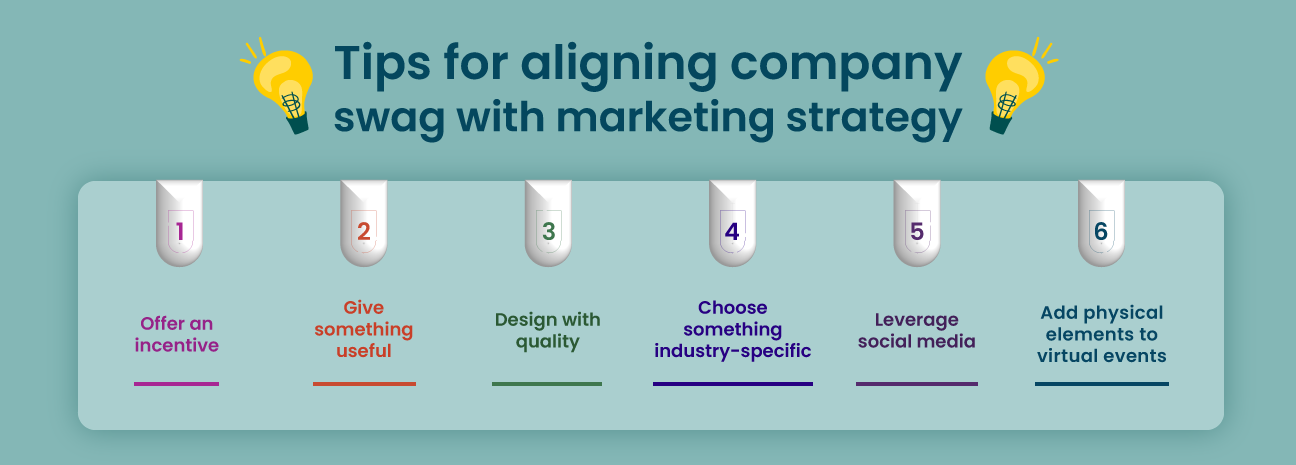
1. Offer an incentive
Everyone loves free stuff, right? But to really make your swag stand out, consider offering an incentive for recipients to engage further with your brand.
For example, you could include a coupon or discount code with your swag to encourage customers to make a purchase. This will not only make your swag more valuable to your customers but also give them an extra reason to engage with your brand.
2. Give something useful
Another way to make sure your swag aligns with your marketing strategy is to give recipients something useful. Think about the needs of your target audience and choose swag items that solve a problem they might have or that they will use regularly. This will keep your brand at the forefront of their minds and create a positive association between your brand and their needs.
3. Design with quality
When it comes to swag, quality matters. If you want recipients to use and love your swag, it needs to be well-designed and well-made. This not only enhances the recipient's experience but also reflects positively on your brand.
Invest in quality materials, work with professional designers, and choose products that are built to last.
4. Choose something industry-specific
Choosing swag that is industry-specific can be a great way to show that you understand your target audience's needs and interests. Here are a few examples of industry-specific swag.
- Tech Industry - USB drives, wireless chargers, laptop sleeves, and phone grips.
- Health and Wellness Industry - Water bottles, yoga mats, fitness trackers, and protein shakers.
- Food and Beverage Industry - Bottle openers, wine stoppers, coasters, and aprons.
- Education Industry - Notebooks, pens, highlighters, and backpacks.
By choosing industry-specific swag, you can demonstrate that you understand the unique needs of your target audience and show that your company is a valuable resource for them.
Additionally, industry-specific swag can create a sense of community and belonging among recipients, further strengthening their connection to your brand.
5. Leverage social media
Leveraging social media is a great way to extend the reach of your company swag and increase engagement with your target audience. Here are a few ways to do it:
- Feature loyal customers on social media - One of the best ways to promote your company swag is to feature photos of happy customers wearing or using it on social media. Not only does this create a sense of excitement and anticipation among potential customers, but it also encourages current customers to share their experiences with your brand.
- Run a social media contest - You can also leverage social media to run a contest or giveaway featuring your company swag as the prize. Encourage users to post photos or videos using your swag and tag your company in the post. This can generate a lot of user-generated content and increase awareness of your brand among a wider audience.
- Use social media to drive traffic to your website - You can also use social media to drive traffic to your website, where customers can learn more about your products and services and make a purchase. Be sure to include links to your website in your social media posts and encourage customers to visit your site to learn more.
By leveraging social media, you can maximize the impact of your company swag and increase engagement with your target audience. Just be sure to tailor your approach to the specific social media platform and the preferences of your target audience to achieve the best results.
6. Add physical elements to virtual events
With virtual events becoming more and more common, it's important to think about how swag can enhance the virtual experience. Consider sending swag bags to virtual event attendees, complete with items that will enhance their experiences, such as branded water bottles or snacks.
This will help to create a more immersive and memorable virtual experience, while also aligning with your overall marketing strategy.
By following these tips for aligning company swag with your marketing strategy, you'll create a powerful tool for promoting your brand and engaging with your target audience. Remember, the key is to make sure your swag is well-designed, relevant, and offers value to your customers.
Want to know how to engage your audience effectively in virtual events using swag? Here’s a good read for you: Swagging Up Virtual Events: Boosting Attendee Experience.
Choose and customize your swag to fit your marketing strategies with Swageazy
We've learned that using company swag is an effective way to enhance your marketing strategy. It helps increase brand recognition and awareness, is cost-effective, has a long-lasting impact on recipients, and creates a positive association with the brand.
As you plan your next marketing campaign, remember that swag can be a powerful tool for building brand awareness, engaging with customers, and driving leads. But choosing the right swag can be a daunting task, and that’s where Swageazy comes in.
Swageazy is a premium corporate gifting platform that takes your corporate gifting game to the next level. We offer a wide range of premium, high-quality products and swag packs that can be customized to fit your brand and marketing goals. Our designers will work with you through every stage of the process to ensure that the gift is tailored to your needs.
At Swageazy, we pride ourselves on our real-time pricing updates to ensure 100% transparency, so you never have to guess about the costs involved. There are no hidden costs whatsoever. Plus, we offer lightning-fast customer support if you ever need help with anything.
So why wait? Get in touch with us today to see how you can choose and customize your swag to fit your marketing strategy today!